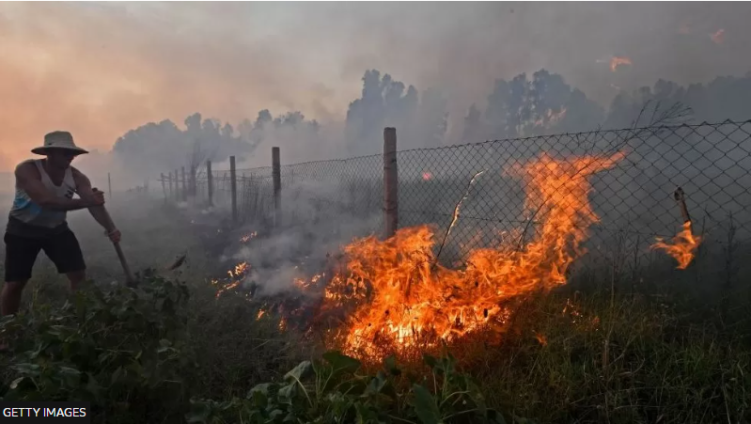At least 34 people have been killed and thousands evacuated after wildfires broke out across Algeria, the country's interior ministry says.
Outbreaks of 97 wildfires were recorded across 16 provinces affecting forest, crops and farmland on Monday.
About 8,000 firefighters were working to bring the blazes under control, authorities said.
Twenty-six people were also injured and 1,500 evacuated from their homes in Fenaia, Bejaia, Zbarbar and Bouira.
Ten soldiers were killed battling the fires in Bejaia, the Algerian defence ministry said.
The most extensive fires, in the mountainous Kabylie region to the east of Algiers, spread to residential areas in the coastal towns of Bejaia and Jijel, fanned by high winds.
Authorities said they had launched a judicial investigation into the causes of the fires.
Northern Algeria has been experiencing a record heatwave in recent days, with temperatures reaching 48C.
Temperatures in several regions in North Africa are up to 7C higher than normal for the time of year.
Algeria's Meteorological Office has warned that temperatures of more than 48C are likely to continue until the end of the month in the north of the country.
On Monday, Algeria's national electricity and gas company, Sonelgaz, said it had recorded a "historic peak" in electricity consumption.
A leading outlet critical of the government, Tout Sur l'Algerie (TSA), reported earlier this month there had been an unprecedented use of air conditioners, saying current methods of construction were less effective than traditional bricks in keeping homes cool.
Meanwhile, southern Europe has been dealing with a challenging heatwave that has seen Greece ravaged by wildfires.
The UN weather agency, the World Meteorological Organization, has warned that the heatwave in Europe could continue into August and that the extreme temperatures sweeping the globe are the new normal in a world warmed by climate change.
The three hottest days ever recorded were in July, according to the EU climate and weather service, Copernicus.
The average world temperature hit 16.89C on Monday 3 July and topped 17C for the first time on 4 July, with an average global temperature of 17.04C.
Provisional figures suggest that was exceeded on 5 July when temperatures reached 17.05C.
The World Meteorological Organization says extreme weather patterns highlight the need for greater climate action.
Climate change increases the risk of the hot, dry weather that is likely to fuel wildfires. The world has already warmed by about 1.1C since the industrial era began and temperatures will keep rising unless governments around the world make steep cuts to emissions.
Latest Stories
-
Children fall ill in India ‘after dead snake found in school meal’
17 minutes -
Apple says most US-bound iPhones no longer made in China
34 minutes -
Clooney gets Tony nomination for Broadway debut
45 minutes -
Trump ousts Waltz as national security adviser and nominates him for UN post
57 minutes -
US judge blocks use of Alien Enemies Act to deport Venezuelans
1 hour -
Mahama proposes ceremony to honour Agya Koo Nimo
3 hours -
Blackstar Experience: Government’s flagship programme for tourism, culture and creative arts launched
4 hours -
Harrods latest retailer to be hit by cyber attack
4 hours -
British woman, 115, becomes world’s oldest person
5 hours -
Football-loving Brazilian nun, world’s oldest person, dies at 116
5 hours -
COCOBOD probes $263 million cocoa rehabilitation loan disbursement
5 hours -
Xbox prices hiked worldwide amid tariff uncertainty
5 hours -
COCOBOD CEO reveals plans to protect cocoa farms from miners
5 hours -
Afenyo-Markin accuses Council of State of complicity in Chief Justice’s suspension
7 hours -
PHOTOS: President Mahama applauds workers on May Day
8 hours

